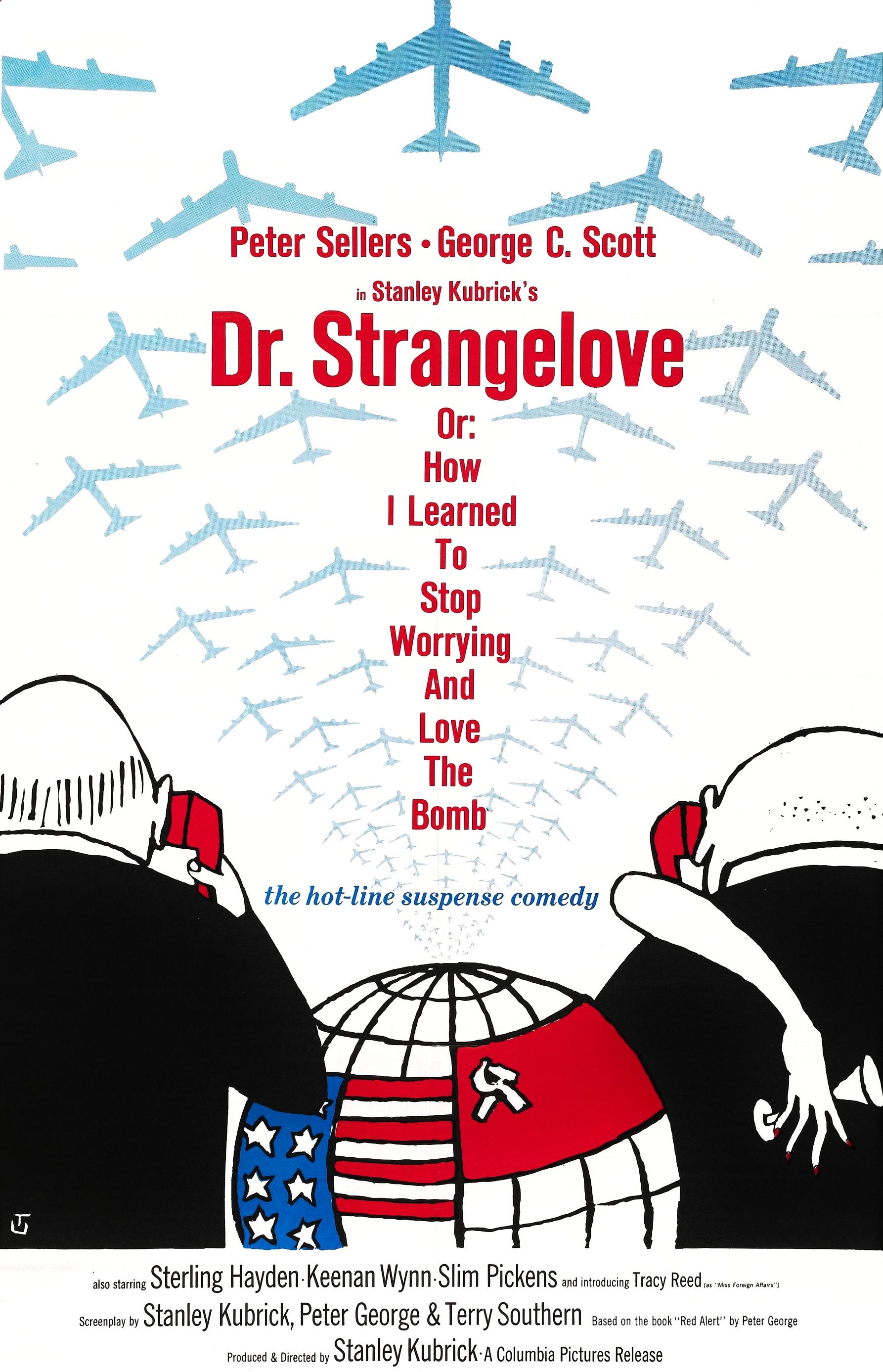Film Review: Dr. Strangelove (1964)



On more than one occasion, when it’s revealed that a friend has never seen Dr. Strangelove, I have stopped the conversation and made some popcorn. Strangelove’s satire stretches the divide of political partisanship, exposing the insanity of the Cold War, the arms race, the military industrial complex, masculinity, and politics in general. The absurdity of it all lays bare with great wit, hilarity, and honest-to-God truth. It should be required viewing for high school students when they reach the chapter on post-WWII America, and everyone else should watch it again every few years.

The phrase “Peace is our Profession” is seen written on billboards and signs throughout the film. This simple four-word phrase sums up the irony of Dr. Strangelove in a nice, neat little package. Often, the words are the backdrop for rapidly firing machine guns and exploding Army trucks. They are words that hold deep meaning for Brigadier General Jack Ripper (Sterling Hayden) – which is exactly why he sends U.S. planes to bomb Russia. He’s determined that the “international Communist conspiracy” has reached a level of wickedness that demands action – for the sake of the American way, and the world. By starting a nuclear war, General Ripper, in his own mind, is honoring the slogan.

The scramble to recall the planes before they can unleash their payload, and the diplomatic fallout that the order has created, make for some of the most hilarious and sardonic dialogue of the 1960s. With the fate of the world at stake, the president of the United States (Merkin Muffley, one of three roles by Peter Sellers) and Soviet Premier Dimitri Kissov argue via telephone over which of them is sorrier for the General who “went and did a silly thing.”
“Well listen, how do you think I feel about it?… Can you imagine how I feel about it, Dimitri?” – President Merkin Muffley to Soviet Premier Dimitri Kissov

Sellers, of course, plays three roles. He’s such a chameleon that if you had no prior knowledge of the film whatsoever, it stands to reason that you’d never know. In addition to President Muffley, he plays General Ripper’s Executive Officer, Group Captain Lionel Mandrake – a British exchange officer who attempts to convince the general to recall the wing – and the titular Dr. Strangelove – a mysterious ex-Nazi scientist and nuclear weapons specialist. Sellers was initially on board to play a fourth role – that of Major Kong – but was reluctant about pulling off the Texas accent. Slim Pickens famously picked up the slack and is perfect as the cowboy pilot – and has one of the most iconic deaths scenes in movie history.

Sellers is at the top of his game. By 1964, he was already well defined as both a comedic genius and an impossible maniac. His antics, both on-set and in his personal life, had been out of control for some time (and would only get worse until his death in 1980), but Kubrick had a calming effect on him. The two respected each other greatly, and Sellers never felt the need, or dared, to act out on Kubrick’s set. Much of Sellers work through the ‘60s and ‘70s is spoiled by his behind the scenes tantrums and impossible demands, but in the case of Dr. Strangelove, the admiration between director and star shines through on-screen like a white-hot fiery flame.

Sellers, an ardent opponent of multiple takes, is so good that Kubrick often left the camera rolling to allow him to get it all out in one go. The results are not only priceless for us as viewers, but also for cast members, who can be seen cracking up in the background. When you strike gold, it’d be foolish to stop digging.

Sellers gets top billing for good reason, but George C. Scott is the unsung hero. His delivery as General Buck Turgidson is one of the best physical comedy performances that ever came down the pike. Watch his expressions as he reacts to the Russian Ambassador (Peter Bull), or while he gets worked up about “Plan R” and the fortitude of the USAF. His incessant gum chewing, constant throat clearing, and his bullish, uber-patriotic attitude are perfect foils for Sellers’ deadpan President Muffley and eccentric Strangelove. To General Turgidson, everyone else is crazy. His way of thinking is the only thing that makes sense. He finds all other opinions and personalities foreign and strange. He’s the quintessential American, and Scott’s brilliant portrayal is pure comedy gold.

Kubrick is a master at pointing out hypocrisies and absurdities. His other two anti-war films – Paths of Glory (1957) and Full Metal Jacket (1987) – are one-stop-shops for war-time incompetence, folly, and callousness. Dr. Strangelove isn’t just an anti-war film, though. It’s about the sheer foolishness of competitive attitudes – the need to always be right, the world be damned. It’s a critique of the male psyche (only one woman, Tracy Reed, appears in the entire film), and the male need to destroy to remain on top. It’s also one of the most intelligently funny movies ever made, so it’s got that going for it too.
